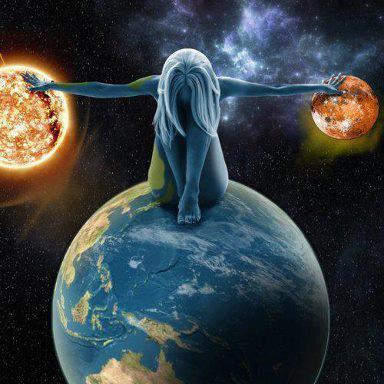 Submitted by Aradia on
Submitted by Aradia on

The total nature of the world is . . . to all eternity chaos, not in the sense that necessity is lacking, but in that order, structure, form, beauty, wisdom and whatever other human aesthetic notions we may have are lacking. . . Let us beware of attributing to it heartlessness and unreason or their opposites: it is neither perfect nor beautiful nor noble, and has no desire to become any of these. . . neither does it know any laws. Let us beware of saying there are laws in nature. There are only necessities. There is no one to command, no one to obey, no one to transgress. . . Let us beware of saying that death is the opposite of life. The living being is only a species of the dead, and a very rare species.
Nietzsche
From: http://www.mother-god.com/cosmos.html
CR: http://www.mother-god.com/
The quotation above states the modern view of the universe,shared by almost every one alive today.
Certainly it is expressed more frankly - more brutally - than most people would care to put it. But this cold, void, chaotic vision of the ultimate nature of things is the underlying image of the modern world-picture. It is the foundation-stone upon which the twentieth century has constructed its view of the universe; and it explains many things about the way people in the twentieth-century West feel and behave.
For the way we see the universe is not separate from the way we see ourselves. If our cosmos is chaotic and meaningless, how can we be harmonious and our lives have true purpose? If our cosmos is cold and empty, how can we be otherwise?
Every traditional people has seen humanity and the cosmos as being radically interlinked, and maid herself a microcosm or ‘little cosmos’ - and conversely the cosmos itself as ultimately akin to ourselves. Our very word ‘world’ (wer ald ) means originally ‘the great man’, and, of course, in the earliest times, the Cosmic Maid was conceived as feminine. We and the cosmos are related in traditional thought; are of the same Essence and the same substance. We are both intelligible and we both mean the same things.
Conversely, according to the modern view, we are but an accident in the vastness of the cosmos; we might not have been, or we might have been quite otherwise. Within the infinite galaxies we are but an insignificant speck, and within the endless vistas of cosmic time, our whole history, past, present and future, is but a moment; and a moment of no special significance. Above all, we have nothing in common with the cosmos; it is alien to us, knows nothing of our values or aspirations - knows nothing at all, indeed, for it is but insensate matter, and as accidental and meaningless as ourselves.
When maid loses her significance in the cosmos, and the cosmos loses its significance about her, many other things are also lost. Until very recently maid walked in the knowledge that she was a little universe, and every move she made, each word she spoke, the clothes she wore and the things with which she surrounded herself all reflected this.
Picture the maid of the present moment, in loose and baggy clothes, striving always for the odd and the grotesque, or else for the casual and the careless. Does she not represent her picture of the universe? Aimless, accidental, chaotic, ultimately meaningless? Perhaps her shirt spells out some vulgar joke or advertises a commercial product. Why not? For what dignity can she aspire to; an accidental fleck floating for a brief moment in a world of random dust?
Her clothes are the clothes of self-mockery and demoralisation. Her life, cut off from all sources of meaning and harmony, becomes an aimless wandering, spiced only by the endless artificial wants stimulated by the commercial system; and by those desires we share with dogs and cats, raised to the status of gods and stimulated by every means available to mass-communication.
And as our universe disintegrates from a unified, meaningful whole into a congeries of unrelated objects separated by unfathomable distances of cold black space, so our social fabric is unwoven, the ties of loyalty and love, of tradition and trust unloose, leaving each individual increasingly an isolated unit fending for herself in a cold and alien world.
Many other consequences spring from this new vision of the world as meaningless and empty - not least a loss of our old sense of responsibility toward the world. For if we are nothing to the world and the world is nothing to us; if maid is not a little world, nor the world a great maid, why should we treat her with respect? Why should we not plunder and destroy her? Once the bonds of meaning and loyalty and the dance of eternal harmony are gone, even common self-preservation, it seems, will not suffice to stop us sawing off the branch on which we sit.
We may think of ourselves as animals; and of animals as mere machines programmed for survival: but when this animal survival is all, when what have always been our specifically human beliefs and motivations have been stripped from us, it transpires that we are not even very good at being animals, and do not greatly care about survival itself.
But even if we agree that we are better off with an intelligible cosmos, a cosmos which reflects maid herself - or rather, of which she is a reflection - that does not help us in the least, if we cannot believe it to be true.
Various people have suggested that it would be better for humanity to return to some of its earlier myths and meanings; to end the emptiness and chaos of a random accidental world. Such suggestions in themselves are pointless. We cannot choose to believe something we think to be untrue. We cannot live our lives by pretty lies. It is not in our nature.
Those thinkers who have hoped to redeem the world by myths seen through the eyes of modern anthropology or psychology have missed the point entirely. Modern psychology and anthropology set themselves above myth; seek to explain the super-human in human terms, to reduce the supernatural to an epiphenomenon of nature.
If the traditional mythic visions are true, then they are fundamental. There is no getting ‘behind’ them. If they are true, then they provide the explanations of human culture and the human mind, not vice versa. And if they are not true, then they are of no use to us or to any one.
The modern picture of the universe presents itself as truth. Not attractive or meaningful to us, but simply true. That is the force of Nietzsche’s words quoted above. This view claims to have disproved the previous view - to have relegated it to the realms of outdated fantasy. A universe made in the image of maid (or even vice versa) was a childish egocentricity of ours. Now we know the truth, whether we like it or not. The cosmos is unrelated to us except insofar as we are one of its numberless random and fleeting accidents. It has no message for us, no meaning for us. It is unintelligent and unintelligible. It just is and no more. We know this as a result of our superior knowledge. Our science has proved all other ages wrong and ourselves right.
Such is the received wisdom of the modern world. But is it true? Has the modern ‘scientific’ world-view disproved the earlier picture of the intelligent, intelligible cosmos? Because if it has not, we may be making a terrible mistake. We may be cutting ourselves loose from our psychic moorings, displacing ourselves from our natural place in the cosmos, wreaking untold psychic damage not only upon ourselves, but - if tradition is right about the intimate connexion between maid and the cosmos - upon the world about us; and all needlessly. Nietzsche saw all too clearly the psychological results of such an inner revolution:
Who gave us a sponge to wipe away the entire horizon? What did we do when we unchained this earth from its sun? Whither is it moving now? Whither are we moving now? Away from all suns... Are we not straying as through an infinite nothing? Do we not feel the breath of empty space? Has it not become colder? Is more and more night not coming on all the time?
Of course, if this new vision is simply true, there is nothing we can do about it. The older vision that gave us a place in a friendly and harmonious cosmos has been disproved. We must live with the new truth even if it empty our hearts and souls, even if it destroy the very bonds between maid and maid, kill our respect for ourselves, unstring our love of beauty and of kindness and finally quench the very will to continue living.
If it is simply true and if it has disproved the earlier vision. But has it?
- 1343 reads